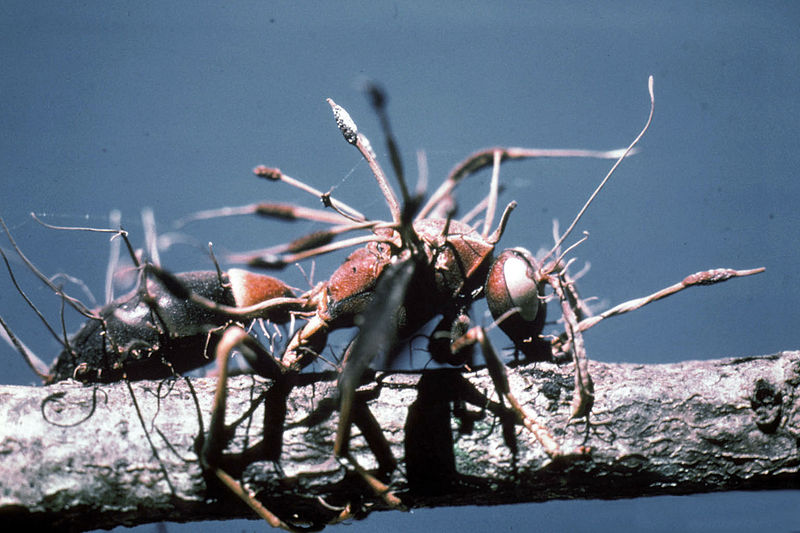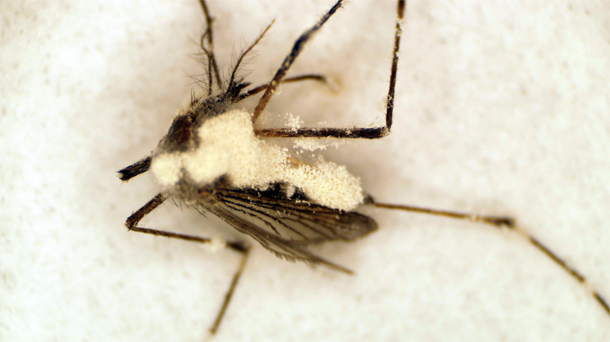|
Post by Samuel Ramsey and Rebecca Wilson In previous colloquia this semester, we’ve had the pleasure of learning about research focusing on a variety of different arthropods, ranging from potato leafhoppers to harvestmen. However, our most recent colloquium deviated slightly with a presentation focusing on entomopathogenic fungi and their potential to control the spread of deadly vector-borne illnesses. Dr. Raymond St. Leger started his presentation in the most well attended colloquium of the semester thus far with a video showcasing a diverse array of stunningly bizarre Cordyceps fungi. Many are known to have a profound and often grotesque effect on their infected insect hosts, with some well known for influencing insect behavior. Entomopathogenic fungi boast great promise as biological control agents due in no small part to their strong host-specificity and staggering diversity. Dr. St. Leger explained that are species of fungi that specialize in killing basically every species of insect. This list includes the mosquitoes responsible for vectoring malaria, a disease that causes more than 1 million human deaths annually. As the mosquito and its Plasmodium parasite is the cause of inimitable human suffering, help from this fungus is entirely welcome. Unfortunately, Cordyceps prefer to grow inside of their host insect, making them rather difficult to culture in labs. The St. Leger lab has circumvented this issue by working with two anamorphs of Cordyceps, Beauveria and Metarhizium. They have lost their sexual phase, and in so doing, are a lot less temperamental. Metarhizium, which occurs frequently in nature as a plant symbiont, initially showed promise as a biological control agent against mosquitoes, but lacked the necessary virulence to kill them quickly enough to prevent the many bites that spread malaria. As St. Leger explained to us, it is not naturally in a pathogen’s interest to exterminate its host species. Mosquitoes infected with Metarhizium, in many cases, were able to feed and even mate before succumbing to their fungal parasite. By super-charging these fungi with proteases, the St. Leger lab was able to significantly decrease the amount of time required to kill mosquitoes and suppressed their appetites, in the interim, even in the presence of potential hosts. Another undertaking in the lab involves producing a fungus that is able to kill the causative agent of malaria inside of the mosquito’s hemolymph and preventing its spread into the salivary glands, thereby curing the mosquito to render her harmless upon her next blood meal. Clearly, the St. Leger Lab has been busy, as they were able to transgenically express a scorpion toxin and that of a funnel web spider in the fungus to greatly increase its virulence. Dr. St. Leger and his graduate students are also involved with developing fungi that can remedy other insect related human health and welfare issues, including famine. They’ve worked with developing and mass-producing strains of Metarhizium that may reduce populations of locusts and coffee borer beetles. Research on this astounding group of fungi and their use in biological control is currently being advanced worldwide. It was great to learn that our own Dr. Raymond St. Leger continues to work at the forefront of this vital field. Fang W, Vega-Rodriguez, J., Ghosh, A.K., Jacobs-Lorena, M., Khang, A and St. Leger, R.J., 2011. Development of transgenic fungi that kill human malaria parasites in mosquitoes Science 331: 1074-1077. Samuel Ramsey is a 2nd year PhD student in the Shrewsbury lab currently studying competition in egg parasitoids of the brown marmorated stink bug.
Rebecca Wilson is a 1st year master’s student in the lab of Dr. Bill Lamp. She is broadly interested in aquatic entomology and is currently studying larval black fly distribution in western Maryland. Comments are closed.
|
Categories
All
Archives
June 2024
|
Department of Entomology
University of Maryland
4112 Plant Sciences Building
College Park, MD 20742-4454
USA
Telephone: 301.405.3911
Fax: 301.314.9290
University of Maryland
4112 Plant Sciences Building
College Park, MD 20742-4454
USA
Telephone: 301.405.3911
Fax: 301.314.9290



 RSS Feed
RSS Feed




